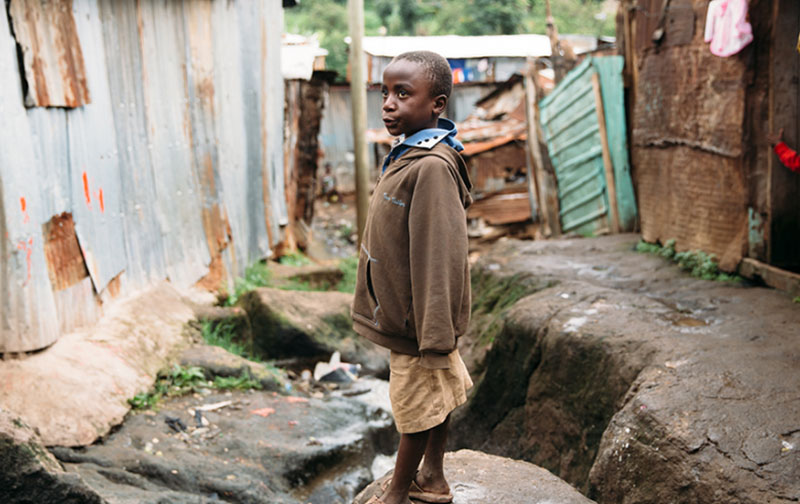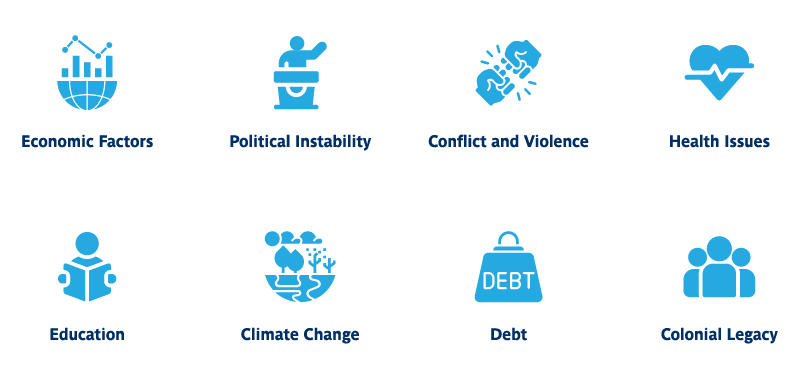
What Causes Poverty in Africa, and How to Help
Wondering why poverty is such a persistent issue in Africa and how you can contribute to change?
Like many things, poverty is a complicated problem with many roots. From economic challenges and political instability, to impacts of climate change and more, there are a number of factors at play in the African continent. There have been mission organizations and nonprofits involved in helping for decades – so why do these challenges still persist?
Major Causes of Poverty in Africa

-
Economic Factors: Many African countries face tough economic times. Things like high inflation, job scarcity, and low wages make it hard for people to make ends meet. Plus, a lot of these economies rely heavily on farming. When things like weather patterns or global market prices change, it can really hurt the livelihoods of these farming communities.
-
Political Instability: Politics can be a bit unpredictable in some African countries. Governments can change frequently, and corruption can be a big problem. This lack of stable and effective leadership makes it hard to put in place the long-term plans needed for economic growth and poverty reduction.
-
Conflict and Violence: Sadly, wars and conflicts are a reality in some parts of Africa. These conflicts can force people to leave their homes, destroy important infrastructure like roads and schools, and disrupt the economy. All of this makes it difficult for people to build a stable and prosperous life.
-
Health Issues: Diseases like HIV/AIDS and malaria are a big problem in Africa. They not only cause a lot of suffering but also lead to high healthcare costs and loss of productivity. When people are sick, they can't work or go to school, and this can trap families in a cycle of poverty.
-
Education: Getting a good education can be a real challenge in some parts of Africa. Without access to quality education, people miss out on the skills and knowledge they need to get better jobs and improve their economic situation.
-
Climate Change: Changes in the weather and climate can have a big impact on farming, which many African economies rely on. When the rains don't come or temperatures change, it can lead to food shortages and make it hard for farmers to earn a living.
-
Debt: A lot of African countries have large debts to pay off. This means they have less money to spend on important things like building roads, schools, and hospitals. These kinds of investments are important for reducing poverty and helping people improve their lives.
-
Colonial Legacy: The effects of colonial rule still linger in many African countries. The economic and political systems set up during colonial times often favored the colonizers, not the local people. This has had long-term impacts that continue to pose challenges today.
When describing Africa, we must be careful not to treat the continent as a monolith. These factors can vary significantly from one country to another, and even within different regions of the same country.
Africa is a massive continent (about 25% larger than North America) and each region has its own unique history and culture, and different languages. Kenya alone has 61 languages currently spoken within its borders. Addressing poverty in any part of Africa therefore requires us to have a deep understanding of the local area in question.
If that sounds discouraging, don’t worry: while organizations like MOHI need to have a deep understanding of these countries to effectively address poverty, you don't necessarily need to have the same level of expertise to make a difference.
Through programs like child sponsorships, you can contribute positively by supporting initiatives that have been specifically designed to meet the unique needs of the communities they serve.
How to Help Address Poverty in Africa
Let’s explore some of the ways you can help.
Engage in Child Sponsorship Programs
Child sponsorship is a highly effective long-term intervention. Sponsored children are more likely to complete secondary school, graduate from college, secure white-collar jobs, and become community and church leaders.
As they grow into leaders, they can contribute to projects addressing clean water, sanitation, and healthcare; they can start small businesses, supporting the local economy; and they can inspire others to pursue education and overcome adversity.
Support Sustainable Development Projects
These projects focus on long-term solutions to poverty and hunger, promoting economic, social, and environmental well-being. They might involve healthcare initiatives, climate-smart agriculture, water and sanitation projects, or educational programs.
By supporting projects like these, you're helping to empower communities and build their capacity to address challenges independently. We do have a number of programs outside of child sponsorship that you can be part of.
To learn more about our special projects, visit the projects area of the MOHI website.
Donating
Donations are a powerful way to contribute to causes you care about. They can help non-profit organizations meet urgent needs, fund specific projects, and continue their vital work. Whether you're supporting education, healthcare, or other initiatives, every donation makes a difference.
You can support local initiatives by working with organizations that involve community members in decision-making processes, encourage microfinance and entrepreneurship, offer vocational training, and create job opportunities.
Mission Trips
Serving on mission trips can be transformative experiences that allow you to make a meaningful impact in the communities you serve. You'll have the opportunity to immerse yourself in the culture, participate in community work, see the impact of sponsorship and development work firsthand, and meet your sponsored child.
Plus, you'll get to experience new things, like trying local food, visiting local markets, and maybe even going on a safari!
Getting started
Whether sponsoring a child or embarking on a mission trip, every step you take makes a difference, and those steps add up to something miraculous. Even if you don’t have deep expertise on the causes of poverty in Africa (or how to address it), you can always support organizations who do. Together, we can break the cycle of poverty.
If you’re ready to see what’s next, you can read more details about what you can do to help, or find out how to get involved with child sponsorship.

Comments